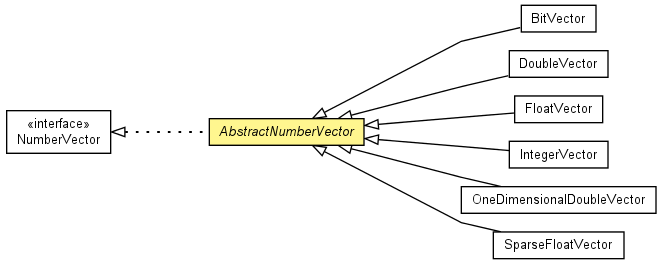| Overview | Package | Class | Use | Tree | Deprecated | Index | Help |

|

|
|||||||||
| PREV CLASS NEXT CLASS | FRAMES NO FRAMES | |||||||||
| SUMMARY: NESTED | FIELD | CONSTR | METHOD | DETAIL: FIELD | CONSTR | METHOD | |||||||||
java.lang.Objectde.lmu.ifi.dbs.elki.data.AbstractNumberVector<V,N>
V - the concrete type of this AbstractNumberVectorN - the type of number, this AbstractNumberVector consists of (i.e., a
AbstractNumberVector v of type V and dimensionality
d is an element of Nd)public abstract class AbstractNumberVector<V extends AbstractNumberVector<? extends V,N>,N extends Number>

AbstractNumberVector is an abstract implementation of FeatureVector.
| Field Summary | |
|---|---|
static String |
ATTRIBUTE_SEPARATOR
The String to separate attribute values in a String that represents the values. |
| Constructor Summary | |
|---|---|
AbstractNumberVector()
|
|
| Method Summary | |
|---|---|
byte |
byteValue(int dimension)
Returns the value in the specified dimension as byte. |
boolean |
equals(Object obj)
An Object obj is equal to this AbstractNumberVector if it is an instance of the same runtime class and is of the identical dimensionality and the values of this AbstractNumberVector are equal to the values of obj in all dimensions, respectively. |
float |
floatValue(int dimension)
Returns the value in the specified dimension as float. |
double |
getMax(int dimension)
Returns the maximum coordinate at the specified dimension. |
double |
getMin(int dimension)
Returns the minimum coordinate at the specified dimension. |
int |
hashCode()
|
int |
intValue(int dimension)
Returns the value in the specified dimension as int. |
short |
shortValue(int dimension)
Returns the value in the specified dimension as short. |
| Methods inherited from class java.lang.Object |
|---|
clone, finalize, getClass, notify, notifyAll, toString, wait, wait, wait |
| Methods inherited from interface de.lmu.ifi.dbs.elki.data.NumberVector |
|---|
doubleValue, getColumnVector, getRowVector, longValue, minus, multiplicate, negativeVector, newInstance, newInstance, nullVector, plus, scalarProduct |
| Methods inherited from interface de.lmu.ifi.dbs.elki.data.FeatureVector |
|---|
getDimensionality, getValue, newInstance, newInstance, toString |
| Methods inherited from interface de.lmu.ifi.dbs.elki.data.spatial.SpatialComparable |
|---|
getDimensionality |
| Field Detail |
|---|
public static final String ATTRIBUTE_SEPARATOR
| Constructor Detail |
|---|
public AbstractNumberVector()
| Method Detail |
|---|
public boolean equals(Object obj)
equals in class Objectobj - another Object
public int hashCode()
hashCode in class Objectpublic double getMin(int dimension)
SpatialComparable
getMin in interface SpatialComparabledimension - the dimension for which the coordinate should be returned,
where 1 ≤ dimension ≤ getDimensionality()
public double getMax(int dimension)
SpatialComparable
getMax in interface SpatialComparabledimension - the dimension for which the coordinate should be returned,
where 1 ≤ dimension ≤ getDimensionality()
public byte byteValue(int dimension)
NumberVectorgetValue(dim).byteValue(), but usually this is much more efficient
due to boxing/unboxing cost.
byteValue in interface NumberVector<V extends AbstractNumberVector<? extends V,N>,N extends Number>dimension - the desired dimension, where 1 ≤ dimension ≤
this.getDimensionality()
public float floatValue(int dimension)
NumberVectorgetValue(dim).floatValue(), but usually this is much more efficient
due to boxing/unboxing cost.
floatValue in interface NumberVector<V extends AbstractNumberVector<? extends V,N>,N extends Number>dimension - the desired dimension, where 1 ≤ dimension ≤
this.getDimensionality()
public int intValue(int dimension)
NumberVectorgetValue(dim).intValue(), but usually this is much more efficient
due to boxing/unboxing cost.
intValue in interface NumberVector<V extends AbstractNumberVector<? extends V,N>,N extends Number>dimension - the desired dimension, where 1 ≤ dimension ≤
this.getDimensionality()
public short shortValue(int dimension)
NumberVectorgetValue(dim).shortValue(), but usually this is much more efficient
due to boxing/unboxing cost.
shortValue in interface NumberVector<V extends AbstractNumberVector<? extends V,N>,N extends Number>dimension - the desired dimension, where 1 ≤ dimension ≤
this.getDimensionality()
|
|
|||||||||||
| PREV CLASS NEXT CLASS | FRAMES NO FRAMES | |||||||||||
| SUMMARY: NESTED | FIELD | CONSTR | METHOD | DETAIL: FIELD | CONSTR | METHOD | |||||||||||